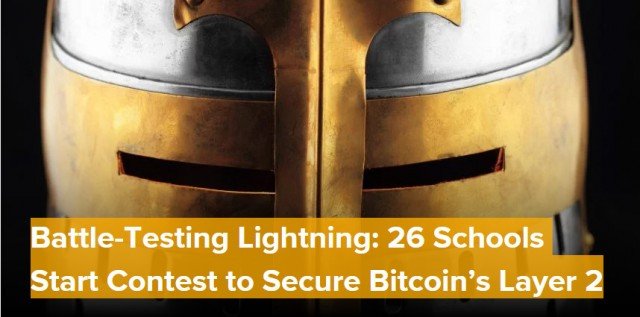Battle-Testing Lightning: 26 Schools Start Contest to Secure Bitcoin’s Layer 2
While numerous see the Lightning Network as the principle seek after bitcoin's scaling issues, it's indistinct whether numerous developers are really attempting to make that a reality.
As indicated by Lightning Labs CEO Elizabeth Stark, there might be as few as 10 total full-time developers concentrated on usage of the innovation, something that is shielded the network from propelling sooner.
Against this setting, a gathering of 26 colleges known as the Bsafe.network have propelled a challenge to allure individuals to assess bitcoin's layer-two innovations, in particular Lightning.
Despite the fact that the prize hasn't been named yet, the challenge hopes to allure specialists, understudies and professors to measure the security and privacy of the network and "gather assault models" that terrible actors could use to upset installments going over the Lightning Network, an innovation which is proclaimed as an approach to scale bitcoin and conceivably lessen expenses.
This additional lift in investigation comes when clients and developers are restless for Lightning to dispatch no doubt.
While Lightning Network developers prescribe just utilizing the innovation on the testnet with dummy coins, a handful of energetic clients and developers have started playing around with the innovation with genuine bitcoin. Some of these courageous analyzers have even lost a minimal expenditure all the while. A couple of organizations, for example, VPN supplier TorGuard, as of now acknowledge Lightning Network installments.
The opposition is propelled by past effective challenges to enhance the cryptography benchmarks generally utilized over the web to secure information, for example, AES and SHA-3, said Bsafe.network prime supporter and Georgetown College look into educator Shin'ichiro Matsuo.
Furthermore, he proceeded with, Bsafe's worldwide test network kept up by the colleges will go about as a nonpartisan research body to break down entries for battle-testing Lightning Network.
Matsuo told Coinmarket:
"We think many enhancements of Lightning Network will come through this competition."
Entries for the challenge, which is available to anybody, are expected in Spring. When every one of the proposition are in, the colleges will test every one of them on Bsafe's worldwide test network, finishing in a meeting in August where victors will be declared.
Making sense of it
Matsuo said he likewise trusts the entries will sparkle a light on the security and protection of the innovation and how it will collaborate with the cryptocurrency's "layer one."
Because nobody can truly know how the innovation will be utilized or abused at scale, this challenge could help. By asking for proposition from everywhere throughout the world, which will be broke down by scholastics from a number of various nations and fields, Matsuo believes the focused climate will reveal insight into what the exact exchange offs are.
"Layer-two technologies such as the Lightning Network are needed to enhance the scalability of payments over the bitcoin blockchain, but they might change the trust model, meaning not be wholly decentralized," he told Coinmarket.
Because of this, the innovation has what's coming to its of commentators, the most grounded of whom fight it won't be decentralized practically speaking.
The challenge, then, is a push to gather bits of knowledge about the Lightning Network's qualities and shortcomings.
Open competition
And after the entries are judged and awarded, the Bsafe.network plans to "reveal all of the evaluations" and open-source all the code so the bitcoin community can pick through it and learn from the results.
In any case, past enhancing the Lightning Network, Matsuo trusts Bsafe.network will have another broader impact on the bitcoin and blockchain industry.
Matsuo wants this challenge to be just the first of many and wants to develop the network of universities that are part of the gathering, with an end goal to make its reach considerably more different.
"With 26 universities and growing, doing this type of open competition gives us a neutral result to compare that kind of technology," he said.
And if the gathering can persuade the wider community of its neutrality, Matsuo trusts those engaged in searing arguments –, for example, the block-size debate – in the community can swing to Bsafe for guidance based on tests. In his psyche, the vitriol that many circumstances originates from the debates is exacerbated by "communication issues" that a Bsafe.network could guide all the more beneficially by providing technical analysis.
He finished up:
"We already have this for cryptography, but for bitcoin and blockchain, we need a more neutral way of analyzing the technology."
